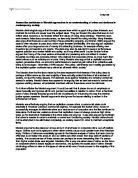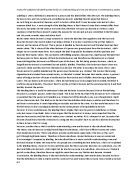These ideas would outrage some contemporary feminists, especially some Marxist feminists as Davis’ ideas on the legalisation of prostitution would exploit females as it uses females to fulfil male sexual desires and with gender roles becoming more equal in contemporary society it uses women demeaning them.
However, Durkheim did also speak about how too much crime is dysfunctional for society, a concept Durkheim called anomie, which is were individuals do not have any firm guidelines about the way to behave with each other. Some of these people are more likely to join a subculture and have their own sets of norms values. An example of this is an inner city gang, who may turn to non-utilitarian crime such as graffiti, this would enforce a sense of belonging within the community and give the gang status amongst the community because people know who they are. This closely links in with Merton’s Strain Theory.
Durkheim was a major influence on the work of American sociologist Robert Merton (1910; 2003). Merton’s strain theory described the ‘American Dream’, that if you worked hard to will achieve highly and the goal of money success and the types of people that may not be able to achieve it, such as ethnic minority, the working class, women and people with long term problems (disabilities/mentally). He noted that whilst chasing the 'American Dream', some people were less likely to succeed using legitimate means than others, which would result in strain being placed upon them. For these individuals crime would be the only way of achieving the 'American Dream'.
Strain in the lower classes happens more frequently than in middle to upper classes according to Merton. Frustration with the systems of society, or possibly economic need, is the probable main cause of strain driving these people to criminality in order to achieve their goals.
Merton used his assessments to describe five types of social activity. Conformity, in which people accept the goals of society and the legitimate ways of achieving these goals, even though they clearly will not be able to achieve them. Most people fall under this category and Merton believed that for this reason society remains stable.
The other four types of behaviour are categorised by Merton as deviant, although each has a different level. Innovation comprises of people who accept the social goals of society but commit crime in order to achieve them. Petty thieves and 'con men' are put into this category along with the unemployed and low skilled workers.
The second type of deviant behaviour, according to Merton, is Ritualism. In this category people go through the motions of everyday life having become distant of their initial goals. Passion within the individual would be lost, and Merton argues that because society sets the goals, lack of desire to fulfil these goals is deviant in itself.
Retreatism is the next category in which people fall into deviant acts. People reject society's goals and the means in which they are achieved. Merton thought that these are people who have dropped out of society, like tramps, drug addicts and alcoholics. They could also be small groups who live together similar to religious cults and new-age travelers.
The last and most deviant reaction is rebellion, which would result in anomie. Groups or individuals would rebel against all values and goals set by the dominant part of society and actively fight against it in attempt to bring a bout a revolutionary change and create a new kind of society. Political radicals and anti-capitalists are current examples of this.
Merton’s theory is a good review of how people react to strain he shows how both normal and deviant behaviour can arise from the same mainstream goals i.e. innovators. However much of Merton’s work was done on American culture, and the ‘American Dream’ that it can not be applied to many societies. He also sees crime as a working class phenomenon because overall official statistics represent then and he is criticised as he takes official statistics by face value. As well as seeing crime as a working class phenomenon he is too deterministic; the working callas do indeed experience the most strain however, not all deviate from the norm. Strain theory assumes that there is a value consensus for money success.
There are a number of sociological theories, which attempt to understand the cause for crime and deviance. However, Subcultural theorists hold the idea that there is nothing "wrong" with criminals and those who commit deviant acts. Instead, they advocate an alternative set of values or a ‘subculture’. The first theorist to use the idea of subculture is Albert Cohen (1955). Cohen believed that ‘status frustration’ is the motive behind delinquent acts. This means that those who feel looked down upon and those who feel that they are denied social status. Thus, they formulate their own dissimilar set of values, as a kind of alternative route to gaining status.
Cohen built on Merton’s theory of ‘strain theory’ which holds that society places much emphasis on material success that many people experience pressure to deviate from accepted norms and values. Deviance occurs when they reject that goal. For example, some people are tempted to use any available means of getting to the top – even if this involves criminal behaviour.
Cohen focused on the deviance amongst working class boys. He argues that they face anomie in the middle class dominated school system. They suffer cultural deprivation and lack the skills needed to succeed in education. Their inability to achieve in the middle class domain leaves them at the bottom on the official status hierarchy. As a result boys suffer ‘status frustration’. They are unable to adjust to the low status given to them by mainstream education and society that they resolve their frustration by rejecting it and turning to males of a similar status forming/joining a delinquent subculture. So Cohen believes. However post modernists believe that the education system is more open and therefore it is more possible for the working class to gain a better education, possibly go to university and gain a better higher paid job. But having failed in the legitimate opportunity structure, boys create their own illegitimate opportunity structure and delinquent subculture which inverts the values of mainstream society, turning them upside down. Cohen believes that the subculture is formed out of spite and malice in contempt for those outside.
Feminists in contemporary society would argue that this research is outdated as at the time of Cohen and Merton, early sociology was very androcentric assuming that all crimes were committed by males, when actually just after Cohen carried out his research the Suffragettes were deviating from the norm and their stereotypical gender role for rights for women.
Cloward and Ohlin (1961) were second to use the idea of subculture in understanding crime and deviance. They suggested that there is an illegitimate opportunity structure, which runs parallel to the legal one. It operates on three levels; criminal subculture; conflict subculture; and retreatist subculture.
The criminal subculture tends to develop in areas where there is a well-established pattern of adult crime. This provides an illegitimate opportunity structure. Young men are presented with role models from who they can learn tricks of the trade. They are given the opportunity to climb the professional criminal hierarchy to become ‘successful’ by participating in crime which brings monetary gain.
The conflict subculture tends to develop in areas where an illegitimate opportunity structure is absent. These areas usually have a high turnover of population and a low level of social cohesion – this prevents established patterns of adult crime from developing. With little opportunity to succeed by either legitimate or illegitimate means, young men become frustrated and angry. They often respond to this situation with gang violence which gives them the opportunity to gain status and respect from fellow gang members.
The retreatist subculture tends to emerge among those who have failed to succeed either by legitimate means or as members of either criminal or conflict subcultures. These ‘double failures’ sometimes form retreatist subcultures based on illegal drug use. This structure is a response to the lack of status and respect they receive from the wider society. Working-class adolescents develop their own subculture, their own forms and values which differ from those of mainstream society. Anti-social and criminal behaviour, which are condemned by the wider society, are valued by the delinquent subculture. And, most importantly, they provide a means by which ‘failed’ working-class young people can solve the problem of status frustration. By succeeding in terms of values of the delinquent subculture, they gain respect and admiration from their peers – those in a similar situation.
Cloward and Ohlin develop both Merton’s strain theory and Cohen’s subcultural theory. They show that working-class delinquency is not simply concerned with material gain. And they identify, and provide explanations for, a number of delinquent subcultures. However, Cloward and Ohlin tend to box off the subcultures they identify and ignore the overlaps between them. For example, gangs involved in the conflict subcultural often deal in drugs and make large sums of money in the process. The same applies to members of the retreatist subculture – some addicts also ‘successfully’ deal in drugs (Winlow, 2001).
‘Strain theory’ and ‘status frustration’ both present a similar picture of society. They assume that there is a consensus or agreement about values. Members of society are socialised into a common value system and become committed, at least in the USA, to the ideal of success in monetary terms. Criminal and deviant subcultures are seen as reactions by young working-class males to their inability to obtain this goal of legitimate means.
Overall, although consensus theories create a good basis for understanding why crime happens in society and reasons behind deviant behaviour some of its ideas are slightly outdated. Ideas such as Mertons ‘American Dream’ was based on American culture, and the ‘American Dream’ that could not be applied to many societies at the time therefore, in contemporary society Merton’s idea could now be considered as inapplicable, because it does not take into account the more varied official statistics, which at the time of Merton writing was mainly based on crimes of the working-class, which is now untrue as we can now see that it not just the working class who are committing crimes but the middle class as well, this is where Merton’s theory is useful with his five categories of deviant behaviour, in particular the Innovator.
Also a lot of the research carried out on this topic was carried out in the early 19th century therefore research into this topic was very androcentric. As a result it ignores the fact that women also commit crimes which in contemporary society is higher than it was when Merton and Cohen were carrying out their research. Feminists would argue this point along with the point that they ignore the crimes commited by males such as domestic violence, such as sexual abuse, however, Davis’ argument that the legalisation of prostitution could hinder domestic violence within the family. In conclusion, although consensus theories are outdated some of the points argued could help develop a more in depth understanding of crime and deviance within contemporary society.
Kat Quantrill... 1207... Mrs Stewart... Page







